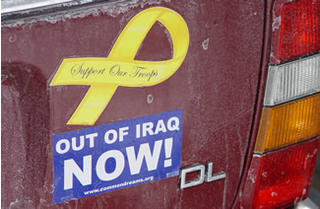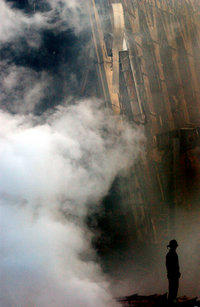ZEN AND THE ART OF MARITAL MAINTENANCE

The author and his bride-to-be, February 2005
Experience is something you don't get until after you need it.
-Oliver's Law
My wife and I met one year ago today on a Friday night blind date. Blind, perhaps, but certainly not deaf, dumb or mute -- by Sunday we had already fallen in love. Exactly three months later I slipped an engagement ring on her finger; in seven more weeks she slid a wedding band onto mine.
Things move quickly for military couples. They must. Your future is unpredictable and plans are often difficult, if not impossible, to make. Procrastination is the ultimate “no-go.” The only certainties are the goals you stake out for yourselves and that you make happen according to your own timetable and priorities.
It has been said that the spouse of a soldier has the hardest job in the Army. She enters marriage hoping for stability and security and receives anxiety and unpredictability in their stead. She longs to be near her husband whose duties often necessitate he spend inordinate amounts of time on the opposite side of the planet from her. And she is left to run the household alone, taking on whatever responsibilities her other half typically handled.
Though U.S. casualty rates in Iraq have held steady in recent months, another devastating toll is being felt on the home front. The Army’s divorce rate has soared in the past three years, as longer and more frequent combat deployments have placed additional strain on those “married to the military.”
Since the martial response to 9/11, the marital attrition among active duty Army personnel has nearly doubled, even as total troop strength remained stable -- and at a time when the overall U.S. divorce rate is steadily drifting downward. Tellingly, survey responses indicate that the top fear of deployed soldiers and their family members is a loss of a significant relationship -- surpassing even death or major injury.
The following points of advice may help in successfully navigating your marriage through the minefield of deployed expectations. Many military relationships gave their lives in the collection of this sensitive information.
Point 1: Frequent Communication Now Will Save You Painful Adjudication Later
Communicating with your spouse from overseas follows the same cardinal rule as does visiting hour at the state penitentiary: always leave your significant other with a smile on her face. Don’t argue, don’t bicker, tell her everything is fine even when it isn’t; unless, that is, you want a strange truck parked in your driveway every night from sundown to sunup. Some wives of deployed soldiers are like gazelles lost in the Sahara -- there’s always a rival lion waiting to pounce.
Most assume it couldn‘t happen to them. It can, and it will if you neglect to adhere to the aforementioned cardinal rule numero uno.
Overheard recently at the camp phone center:
“Yes, Honey, I realize I got really angry with you for going out to the bars last weekend… but did you really think sleeping with the neighbor would make it better?
Email, instant messaging, webcams, long distance phone calls -- all are essential tools for keeping the lines of communication open, and leaps and bounds ahead of anything veterans of wars gone by had the benefit of. However, do not make the mistake of neglecting to write home via the old fashioned method, which brings us to:
Point 2: The Pen is Mightier than the S-word (Separation)
The romantic art of handwritten letters may indeed be a lost art, yet they are still a home run on the homestead; nothing can compete with a heartfelt missive to your wife. The act of contemplation when composing your thoughts is vital to bringing out the side of you that she fell in love with in the first place, and that the stresses of war and years of Army life may have buried or driven out of you.
The realization that your words may outlive you instill them with an air of directness and emotion that she craves but likely rarely receives. This may work so well that your eventual reunion is in some aspects a letdown. Do it anyway. You owe it to her, and she will have certainly earned it by the time you return.
Point 3: Empathize with the Obvious
In many ways the women in our lives we leave behind have it worse, all the creature comforts of home aside. They are often alone and isolated while we are surrounded night and day by coworkers whom we can and do trust with our lives. Our days are filled with activity and tend to blur together; theirs are left with a gaping hole that you used to fill, constant uncertainty their new constant companion.
Fear is rare in combat; far more prevalent is the mind-numbing boredom of the day to day grind. Meanwhile, back in the world, fear is constantly looming, threatening to dominate the day to day existence of your better half. Fear of the unknown; fear that the two of you may begin to drift apart; fear that you will return a different man.
Fear that you may not return at all.
Yet, a strong relationship has the potential to be made even stronger. A marriage that can survive a year of separation can cope with virtually anything, provided you manage the anger, frustration and mental stress that a year in a combat zone can insidiously weave into the fabric of your character. The souls of veterans are not damaged by war per se; only of those who allow the brutish nature of man to run amok within themselves for so long that they forget how to turn it off.
Conversely, an already fragile relationship will be rocked to its core and often torn asunder from the lack of daily maintenance that was previously only holding it together with duct tape and a patch kit. The air will gradually leak out of it until little remains but the shallow façade that it always was.
A long deployment will teach you as much about yourselves as it will about each other. The two of you undoubtedly paid respect to your vows on your wedding day, but now they’re here to collect -- and they don’t take credit. It’s Game Day for your character, and everything you’d like to think about yourself will be pushed to the limit.
Point 4: Leave the Martyrdom to the Enemy
Success in the Army boils down to a single core tenet: your ability to withstand suffering. Many soldiers make the mistake of assuming that nothing back home could ever compare with what they’re going through overseas. They adopt a martyr complex, and minimize the struggles of those left to keep the home fires burning. It is an unfair comparison to make and places their spouse in a no-win situation.
In your mind, nothing that troubles her could possibly compete with your trials and tribulations; ergo, they are trivial, petty and unimportant. This is a fatal mistake, one that will forever place you on uneven footing with your spouse and can sever the bonds of mutual experience that can serve to buttress your relationship from within rather than weaken it from afar. A broken bone will heal stronger than before, but only if set properly and cared for along the way. It is a force that can be harnessed for positive gain or left unbridled to wreak havoc and destroy.
Not everything in life is chosen, yet how one reacts to its challenges is.
Point 5: Compliment the One Who Complements You
Naturally, my wife is despondent when I leave her but respects the reasons why I must. She is proud of me, and I her, for being strong enough to handle the strain of our separation with such poise, dignity and aplomb. She immerses herself in her work in my absence and takes advantage of the additional freedom to pursue opportunities that she likely would not otherwise have been willing to sacrifice our time together for.
My wife is an amazing woman and I wake up every day feeling eternally blessed that she was brought into my life. We would not have met had it not been for my stint in the military, and if nothing else, that has made every second of it worthwhile.
There is an old saw in my profession that if the Army brass had wanted you to have a wife they would have issued you one.
I, for one, am grateful for the policy change.
COPYRIGHT 2005 BUCK SARGENT
My Darling Dearest Husband,
As our journey begins into the unknown year, I have all faith and trust that it will be a benefit. Though I may often weep and at times my heart may feel leaden, I know that through the strength of our spirits and our love we will endeavor and triumph.
I know you will make great discoveries about yourself and your abilities, as will I. Both of us are determined to succeed and we will help each other reach our personal goals through encouragement and love. I know we will grow stronger as a couple and also deepen our already beautiful friendship.
As much as I hate your absence and the knowledge that you are in danger, I am almost looking forward to this challenge. I am proud -- so proud -- to be your devoted wife, and will, as I always have, continue to hold you deep in my heart and spirit.
You are my love, forever and always. You will be in each breath I take and every thought.
All my love,
Your Leading Lady



